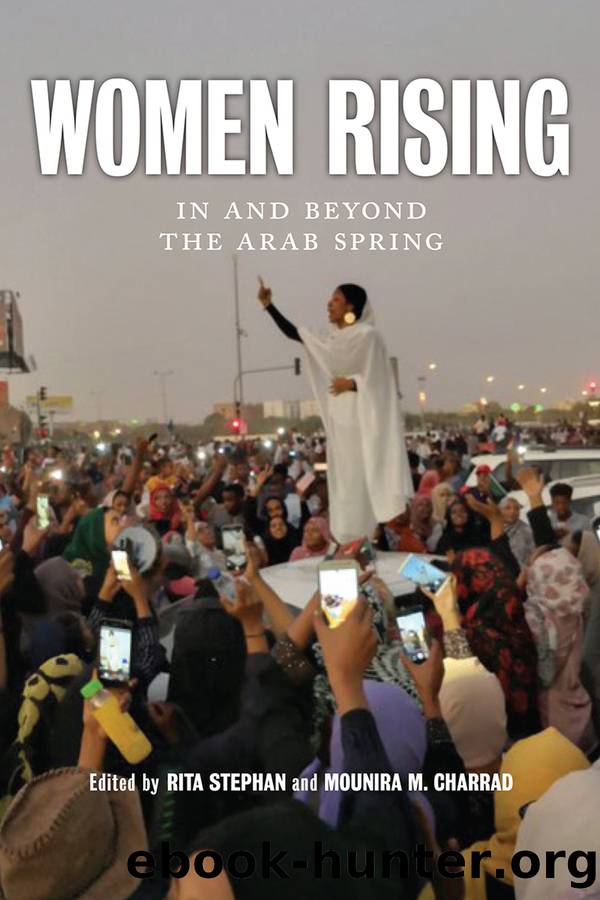Women Rising by Rita Stephan

Author:Rita Stephan
Language: eng
Format: epub
Publisher: NYU Press
Figure 22.1. A scene from The Light in Her Eyes.
NURULSYAHIRAH: How do you think Houda affirms Western feminism and also departs from it?
JULIA: I think that in a way, a lot of the challenges that Houda faces are really similar to the challenges that women in the West face. Women in the West are trying to balance a career with having a family, and Houdaâs living that life too. There are maybe more concrete, inflexible expectations on Houdaâthat she needs to be there for her kids first, and that she needs to serve her husband. But if you think about that a little bit farther, women in the West are doing that too. Theyâre not abandoning their families, their husband, or their children. So, I think that in a way, we find a lot of our values as Western feminists and our ideals confirmed and affirmed and reflected back to us in what Houda is struggling with as well.
LAURA: But I think one of the things that was, to me, the most interesting thing about Houda and spending time around her and her school is how much it made me reflect on my own definition about what feminism means. I think in the West we can sometimes make that definition too narrow and it can become rigid. Houda would never describe herself as a feminist. This is a word and a theory that she rejects completely. But at the same time I do see feminist principles in what Houda is doing. And I also am inspired by her as a feminist in a way that might seem contrary.
NURULSYAHIRAH: Why does Houda call women to be involved without neglecting their family duties?
JULIA: Houda is part of a movement, there are women doing things exactly similar to what sheâs doing all across the Middle East.
LAURA: And this movement is not necessarily organized or centralized in a way, itâs essentially a grassroots movement. Some people have said that this growingâsome people call it the womenâs mosque movement or the piety movementâand some people have said that second to the Arab Spring, itâs the most important social movement happening in the Middle East today. Because of the way itâs changing the culture and how it can potentially change the face of Islam.
NURULSYAHIRAH: What would you want viewers to take away from the film?
JULIA: We want people to be able to have a connection and to be able to feel and see what itâs like in the womenâs side of the mosque, and to understand that through these characters. These are their lives. This is the life they are living. And I think that by showing it through their eyes and their experiences in a deliberately nonjudgmental way, people can be open to understanding that perspective. And I hope that that happens. I hope that if people see the film and then theyâre walking down the street and they see a woman wearing hijab, and if their proclivity or their general stereotype before watching the
Download
This site does not store any files on its server. We only index and link to content provided by other sites. Please contact the content providers to delete copyright contents if any and email us, we'll remove relevant links or contents immediately.
| Arms Control | Diplomacy |
| Security | Trades & Tariffs |
| Treaties | African |
| Asian | Australian & Oceanian |
| Canadian | Caribbean & Latin American |
| European | Middle Eastern |
| Russian & Former Soviet Union |
The Secret History by Donna Tartt(19092)
The Social Justice Warrior Handbook by Lisa De Pasquale(12190)
Thirteen Reasons Why by Jay Asher(8912)
This Is How You Lose Her by Junot Diaz(6888)
Weapons of Math Destruction by Cathy O'Neil(6281)
Zero to One by Peter Thiel(5802)
Beartown by Fredrik Backman(5756)
The Myth of the Strong Leader by Archie Brown(5509)
The Fire Next Time by James Baldwin(5447)
How Democracies Die by Steven Levitsky & Daniel Ziblatt(5219)
Promise Me, Dad by Joe Biden(5154)
Stone's Rules by Roger Stone(5088)
A Higher Loyalty: Truth, Lies, and Leadership by James Comey(4964)
100 Deadly Skills by Clint Emerson(4926)
Rise and Kill First by Ronen Bergman(4790)
Secrecy World by Jake Bernstein(4753)
The David Icke Guide to the Global Conspiracy (and how to end it) by David Icke(4720)
The Farm by Tom Rob Smith(4514)
The Doomsday Machine by Daniel Ellsberg(4490)
